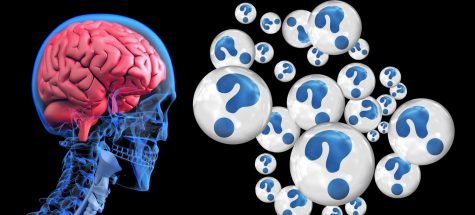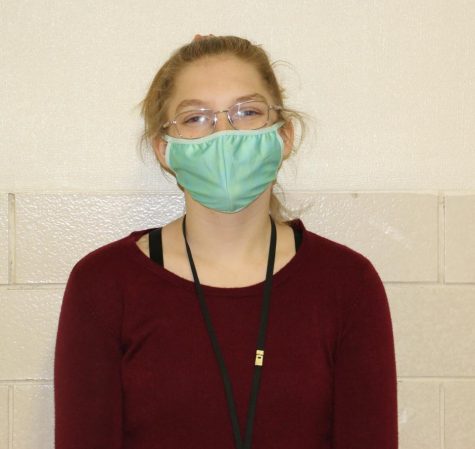Take care of your mental health
December 11, 2020
The weeks leading up to the end of first semester are always stressful for students. And to add to it, students are heading in to finals during a global pandemic. So how can students take care of themselves during these weird and overwhelming times? KHS counselors Caitlin Nieto, Brittanie Davis, Kathleen Sloan and Brandon Jackson offered these tips to students.
What can students do to help their mental health? 
Being preventative goes a long way in improving mental health. Just as with your physical health, you need to practice being mentally healthy every day. Do something each day to help you feel good. The counselors sent out information on The Science of Happiness course. This is a great place to start working on your mental health! The brain is an amazing organ, and we have something called “neuroplasticity.” Neuroplasticity is essentially the brain’s ability to make new connections. When we tell ourselves that we are “no good” (or whatever negative self-talk we might have), our brain physically makes connections that lead us to believe that to be true. However, we can rewire our brains to believe the opposite. It’s truly amazing, and it takes time and practice. Sometimes it takes the help of a professional or medication, but it is possible to unlearn and relearn things that affect mental health.
How do you think students are feeling about all the changes because of Covid?
What we know at this point is that prevalence of anxiety and depression have increased with the onset of the COVID-19 pandemic. This pandemic is considered to be a traumatic event, and experiencing trauma can have significant effects on the developing brain in adolescents and children, as well as adults. A major risk factor in mental disorders is isolation, and COVID-19 has forced people into isolation. We are seeing things that we would expect after any trauma: increased anxiety and depression, withdrawal, difficulty processing information, decreased decision making abilities, and trouble focusing.
What are the causes of depression?
Social factors can contribute to depression. (People spreading rumors at school, not making the sports team, and feeling left out of certain activities at school.) Depression is usually caused by a combination of factors such as biological or genetic predisposition and environmental situations, such as trauma. Oftentimes, it is not possible to pinpoint one sole cause of depression in a person.
How can you tell if someone has a mental health problem?
There could be changes in behavior, attitude, body language, etc. Though some people might not always visibly show any signs of a mental health problem. That is why it is important to talk about mental health and how it looks different for everyone.
How can we speak to people who have mental health problems, such as depression, or anxiety?
It is important to validate other people’s feelings, and not make comparisons. When speaking to someone with a mental illness, it is not helpful to say things like, “I get stressed too,” “everyone goes through that,” “you need to just think positive thoughts,” “get over it,” or “it’s all in your head.” Just because someone else has experienced a hardship that you perceive to be “worse” than another, does not mean that the person you’re speaking to is not having difficulty. The way that mental illnesses affect us are often not logical or rational, so you may never understand “why.” That’s okay. Just try to be supportive and validating.
What should we do if there is an emergency for someone with mental health issues?
Safety is the top priority. If someone is in crisis, they need help immediately. Tell a trusted adult, and call 911 or a crisis line. DO NOT try to handle a mental health emergency on your own; always get help from a professional. The National Suicide Prevention Line is 1-800-273-8255, and the Crisis Text Line is 741-741. If you or a friend is having thoughts of harming yourself or someone else, or thoughts of suicide during school, please see your counselor right away.
What is the best way to improve your mental health?
Speak to your counselor, parents, and therapist. Find a hobby that will help reduce stress. Take a walk at least 30 minutes a day.
How can you tell when you need to see a therapist?
You should consider a therapist when your coping skills are no longer effective and your mental illness has an impact on your daily functioning. Impact on daily functioning could look different for everyone, but may include declining grades, attendance issues, relationship problems, not wanting to get out of bed, avoiding activities or situations you used to enjoy, or no longer wanting to live. Therapy can also be preventative, and is not just for people in distress. Everyone has things in their lives that may require a safe place to talk. Therapy can be a great outlet and avenue for self improvement!
What are the signs of a mental illness?
Since there is such a wide range of mental illnesses, there can be many different signs of a mental illness. Generally speaking, a mental illness causes some sort of distress or disruption to daily life (school, work, relationships, etc). According to the National Alliance on Mental Health (NAMI), warning signs include feeling sad or withdrawn for more than two weeks, trying to harm oneself or end their life, severe, out-of-control risk-taking behaviors that cause harm to self or others, sudden or overwhelming fear for no reason, significant weight loss or gain, seeing, hearing, or believing things that aren’t real, excessive drug or alcohol use, drastic changes in mood, behavior, personality or sleeping habits, extreme difficulty concentrating or staying still, and intense worries or fears that get in the way of daily activities.
